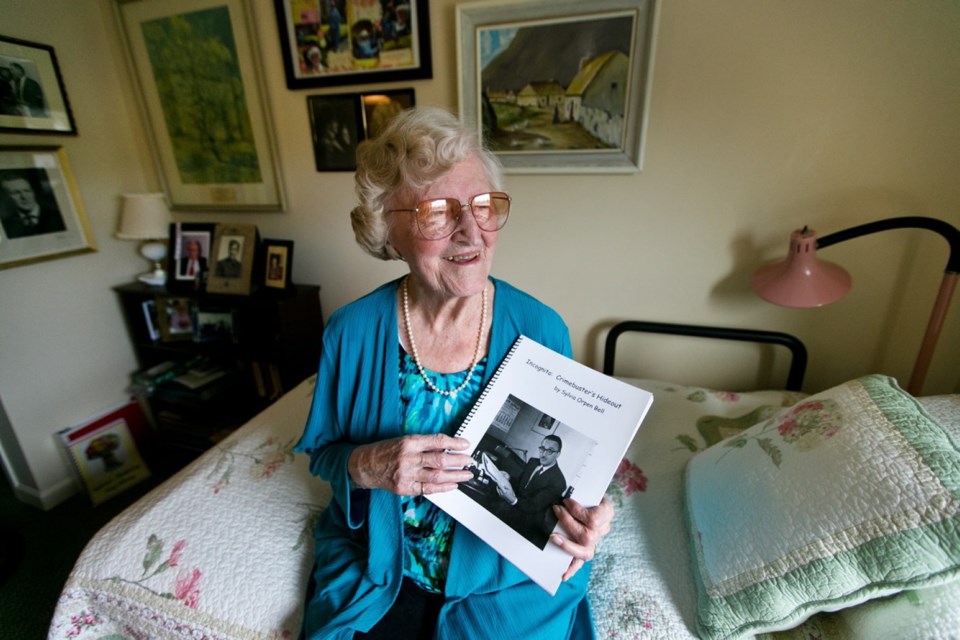A 104-year-old Victoria woman has revealed how she and her mother provided a secret hideaway for a famed Montreal whistleblower in the 1940s.
Sylvia Orpen Bell has self-published Incognito: Crimebuster’s Hideout. The 58-page booklet details how she and her mother, Hetty Orpen, opened their home to lawyer Pacifique (Pax) Plante for six months in 1949. It’s the first time Bell has gone public with the tale.
Fearing for his life, Plante used his time in hiding to write sensational articles for Le Devoir newspaper, exposing underworld and police corruption in Montreal. Plante and fellow lawyer Jean Drapeau (who later became Montreal’s mayor) used the material to launch a public inquiry headed by Judge Francois Caron into police and political collusion with organized crime.
In 1949, Bell’s mother placed an ad for a boarder for their apartment in Montreal’s Westmount suburb. Plante accepted lodgings under the condition that she did not tell others of his presence in their home. Although he initially identified himself as Mr. Roy, he soon revealed himself to be Pax Plante.
“Of course, I had heard of him,” Bell writes in Incognito: Crimebuster’s Hideout. “I had followed newspaper articles about him for many months, even while I resided in Vancouver. He was the courageous man who tried to clean up the vice in Montreal.”
Plante told the family his crime-busting efforts heading a civic morality squad made him a target for crooks profiting from illegal activities. At the time, Montreal — with an international “sin city” reputation — was rife with prostitution, gambling, bookmakers and loan sharks. The corruption extended to police and politicians, as described in Plante’s articles and Caron’s subsequent 1954 report.
In the Bells’ home, Plante took over a bedroom and another room, used as an office. For added security, extra locks were installed on the front and back doors. The family would not accept unknown packages or open doors to strangers. Plante’s family and Drapeau use coded doorbell rings when they visited.
Once Bell spotted a pistol under Plante’s pillow.
“It scared the life out of me. The underworld was gunning for him all that time,” said the soft-spoken white-haired woman, who is legally blind and lives in a seniors’ home at the Cridge Centre for Family.
“Pax was very charming, a very intelligent Frenchman. Well educated, he spoke English very well. We thoroughly enjoyed his company,” she said.
“I said to him one day: ‘How do you feel you can take on the whole city of Montreal?’ That was typically Pax, I think. He would take on anything. He was unafraid.”
After the Caron Inquiry, Plante was appointed Montreal’s assistant police director. Eventually, he and his family moved to Mexico to avoid what he called “the cement-coat treatment.” He lived there until his death in 1976.
Bell said it wasn’t fear of repercussions that led her to wait 67 years before going public with her secret. Not long after harbouring the crusading lawyer, her mother moved from Montreal. Meanwhile, Bell got married to an airline executive, living “all over the world” before retiring to Victoria in 1969. “You know, life goes on,” she said.
Intended mainly for family and friends, Bell has printed just 20 copies of Incognito: Crimebuster’s Hideout. She wrote it with help from her friend Patricia Ball. The pair met weekly for two years to produce the manuscript.
Bell attributes her longevity to good genes and playing sports, including tennis and golf. “I think I must have lived a healthy lifestyle,” she said with a smile.



